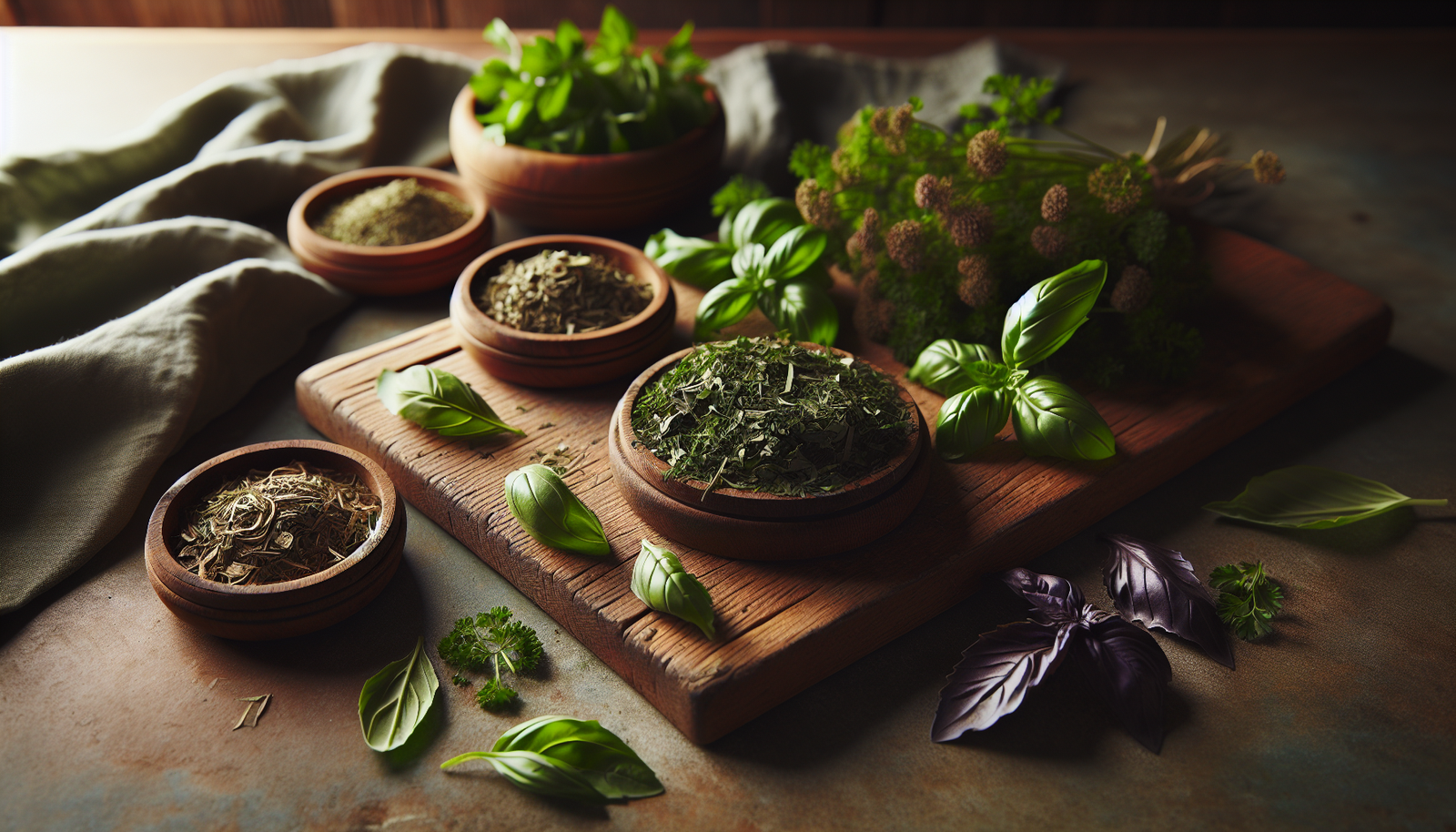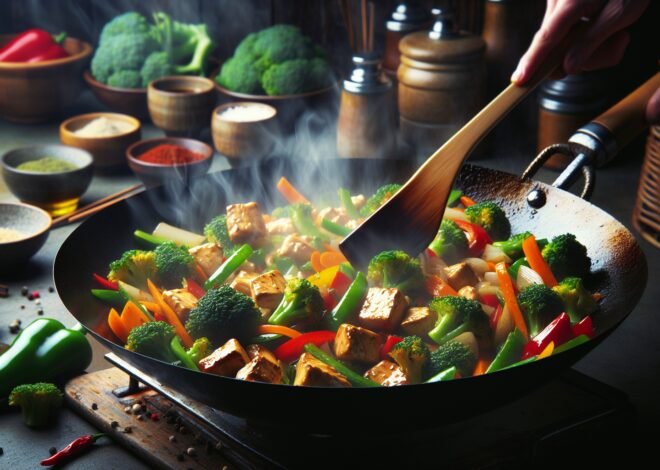
The Role of Herbs in Seasoning: Fresh vs Dried
Herbs play a crucial role in seasoning, but is it better to use fresh or dried? In this article, we’ll compare the two and explore how each type can enhance your cooking. You’ll learn when to choose fresh herbs and when dried herbs might be the better option.
Understanding the Difference Between Fresh and Dried Herbs
Herbs are the heart of culinary magic, transforming dishes with their aromatic presence. Understanding the nuances between fresh and dried herbs can elevate your cooking game. Each type has its unique flavor profile, and knowing when and how to use them can make all the difference in your culinary creations.
Flavor Profiles of Fresh Herbs
Fresh herbs burst with vibrant flavors and aromas, offering a subtlety that dried herbs often lack. The oils in fresh herbs like basil, cilantro, and parsley give dishes a lively and refreshing taste. Their delicate nature means they are best added towards the end of cooking to preserve their flavor.
- Basil: Sweet and slightly peppery, perfect for Italian dishes.
- Cilantro: Citrusy and bold, often used in Mexican and Asian cuisines.
- Parsley: Mild and grassy, great for garnishing and adding freshness.
How Dried Herbs Concentrate Flavor
Dried herbs, on the other hand, have a concentrated flavor due to the removal of water content. This intensifies their taste, making a little go a long way. They are ideal for slow-cooked dishes, where their flavors can meld and develop over time.
- Oregano: Earthy and robust, frequently used in Mediterranean cooking.
- Thyme: Woody and minty, excellent for roasts and stews.
- Rosemary: Pine-like and potent, a favorite for marinades and grilled meats.
When to Use Fresh vs Dried
Choosing between fresh and dried herbs depends on the dish and cooking method. Fresh herbs are ideal for raw dishes, salads, and as final garnishes. In contrast, dried herbs shine in soups, stews, and baked dishes, where they have time to release their flavors fully.
- Use fresh herbs in cold dishes and quick-cooking methods.
- Reserve dried herbs for recipes with longer cook times.
- Adjust quantities—use about three times more fresh herbs than dried to achieve similar flavor intensity.
Best Practices for Using Fresh Herbs
Fresh herbs can elevate a dish from ordinary to extraordinary. However, using them correctly is key to unlocking their full potential. From storage to preparation, there are best practices to follow to keep them fresh and flavorful.
How to Store and Handle Fresh Herbs
Proper storage is essential to maintain the freshness of herbs. Keep them in the refrigerator wrapped in damp paper towels and placed in a plastic bag. Alternatively, store them stem-side down in a glass of water, covered loosely with a plastic bag.
- Store herbs like basil at room temperature to avoid blackening.
- Avoid washing until just before use to prevent spoilage.
- Refrigerate herbs like parsley and cilantro for longer shelf life.
Chopping and Preparing Fresh Herbs
The way herbs are prepared can significantly impact their flavor release. Use a sharp knife to cut or chiffonade leaves softly, preserving the essential oils. Avoid over-chopping, as this can result in bruised herbs with a muted aroma.
- Hold herbs with a gentle grip to avoid crushing.
- Use only the leaves of delicate herbs like cilantro and basil.
- For woody herbs like rosemary, strip the leaves from the stems before chopping.
Adding Fresh Herbs for Maximum Flavor
Timing is everything when using fresh herbs. Add them towards the end of cooking to prevent the flavors from dissipating. In salads, herbs can be mixed in to enhance freshness or used as a vibrant garnish.
- Incorporate herbs like dill and basil just before serving.
- Use fresh herbs generously in dressings and sauces for a zesty kick.
- Slightly crush herbs like mint to release their aroma in cocktails and desserts.
Getting the Best Flavor from Dried Herbs
Dried herbs can be a powerhouse of flavor when used correctly. They require a bit of knowledge and technique to unlock their full potential. From rehydrating to proper storage, these practices ensure your dishes are packed with taste.
Rehydrating Dried Herbs
To get the best out of dried herbs, rehydrate them before use. This process allows them to release their flavors gradually. Add them to liquids at the beginning of cooking, or soak them in a bit of warm water before adding to dishes.
- Allow herbs to soak for at least 10 minutes if adding to cold dishes.
- Use the soaking liquid to add flavor to soups and sauces.
- Combine with oil or vinegar for a quick herb-infused dressing.
Crushing and Toasting for Extra Flavor
Crushing dried herbs before use helps release their essential oils. For even more depth, toasting them lightly in a dry pan can bring out a nuttier, more intense flavor. This is particularly effective for herbs like cumin and coriander.
- Use a mortar and pestle to crush herbs just before cooking.
- Toast herbs on medium heat until their aroma is released.
- Add toasted herbs to rubs and marinades for a flavor boost.
Proper Storage of Dried Herbs
Store dried herbs in a cool, dark place to maintain their potency. Keep them in airtight containers, away from heat and moisture. This helps preserve their flavor and extends their shelf life.
- Transfer herbs to glass jars to prevent air exposure.
- Avoid storing near the stove or in bright sunlight.
- Label jars with purchase dates to monitor freshness.
Conclusion
Whether you use fresh or dried herbs, knowing how to incorporate them into your cooking can greatly enhance your dishes. Fresh herbs offer vibrant, bright flavors, while dried herbs provide concentrated, long-lasting taste. Understanding when and how to use each will help you get the most out of your herbs in any meal.
FAQ
What is the difference between fresh and dried herbs?
Fresh herbs often have a more vibrant aroma and flavor compared to dried herbs. Dried herbs, on the other hand, have a concentrated flavor and longer shelf life, making them suitable for slow-cooked dishes.
When should I use fresh herbs over dried?
Fresh herbs are ideal for dishes that require a bright, aromatic finish, such as salads, sauces, and garnishes. They add a burst of freshness that dried herbs can’t replicate.
How do I store fresh herbs?
Store fresh herbs in the refrigerator. Wrap them loosely in a damp paper towel and place them in a plastic bag. Alternatively, stand them in a glass of water, covered with a plastic bag, keeping them hydrated and fresh longer.
Can dried herbs replace fresh in a recipe?
Dried herbs can replace fresh ones in many recipes, especially in cooked dishes. Keep in mind that dried herbs have a stronger flavor, so you’ll need to adjust the quantity used.
How much dried herbs should I use in place of fresh?
Use one-third the amount of dried herbs in place of fresh herbs. For example, if a recipe calls for 1 tablespoon of fresh herbs, use 1 teaspoon of dried herbs.
How long do dried herbs last?
Dried herbs typically last 1 to 3 years. Store them in airtight containers in a cool, dark place to maximize their shelf life and maintain potency.











